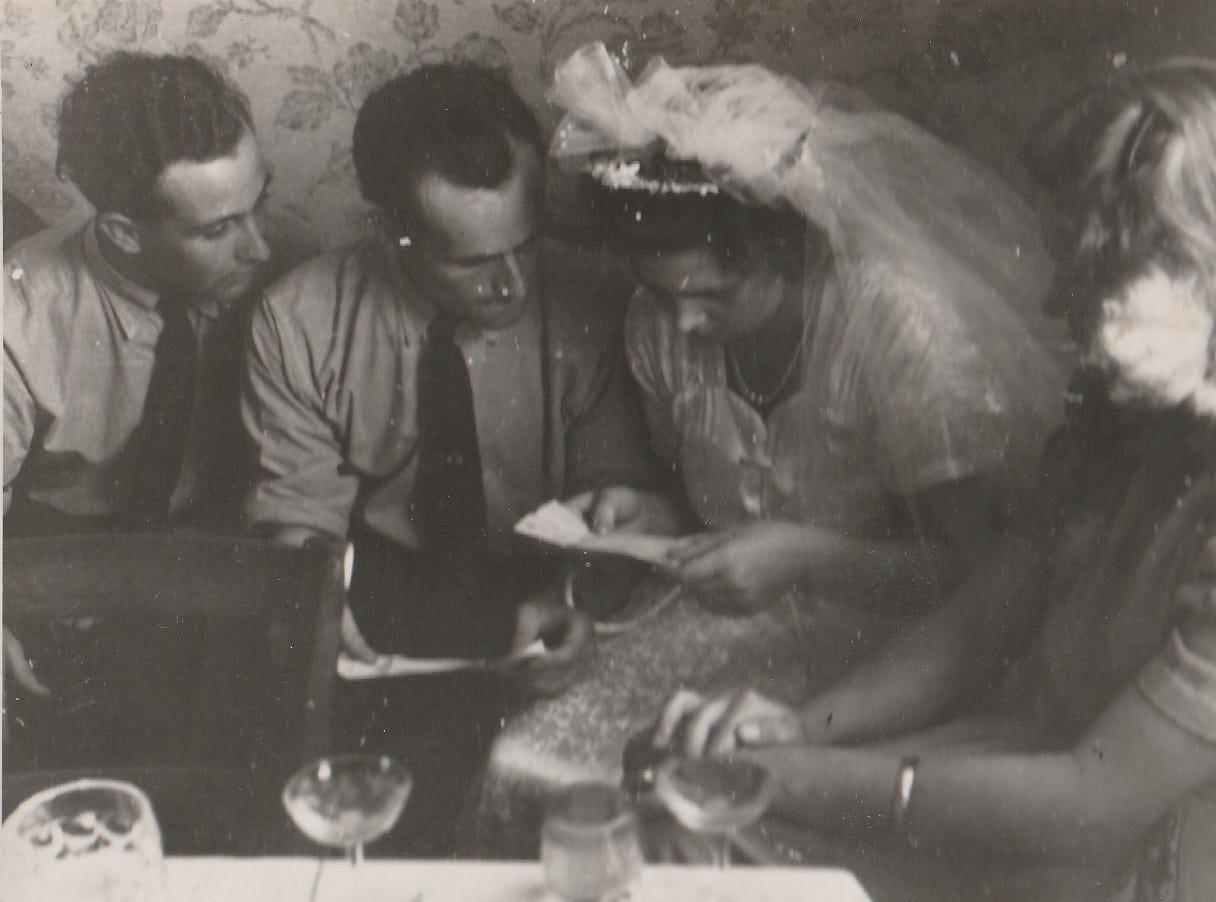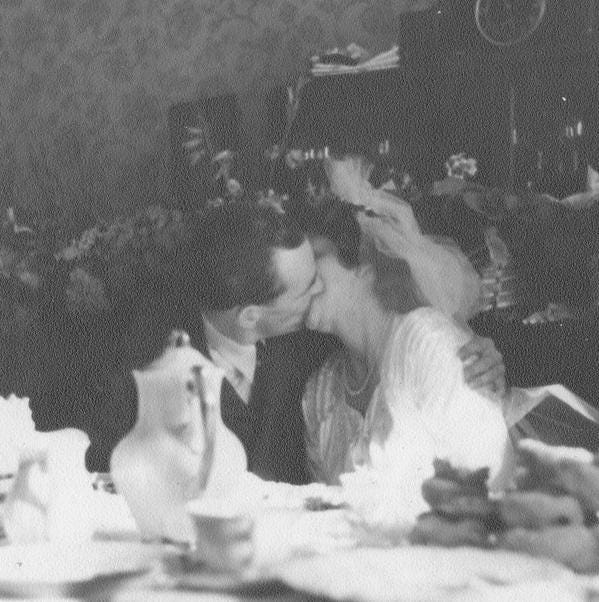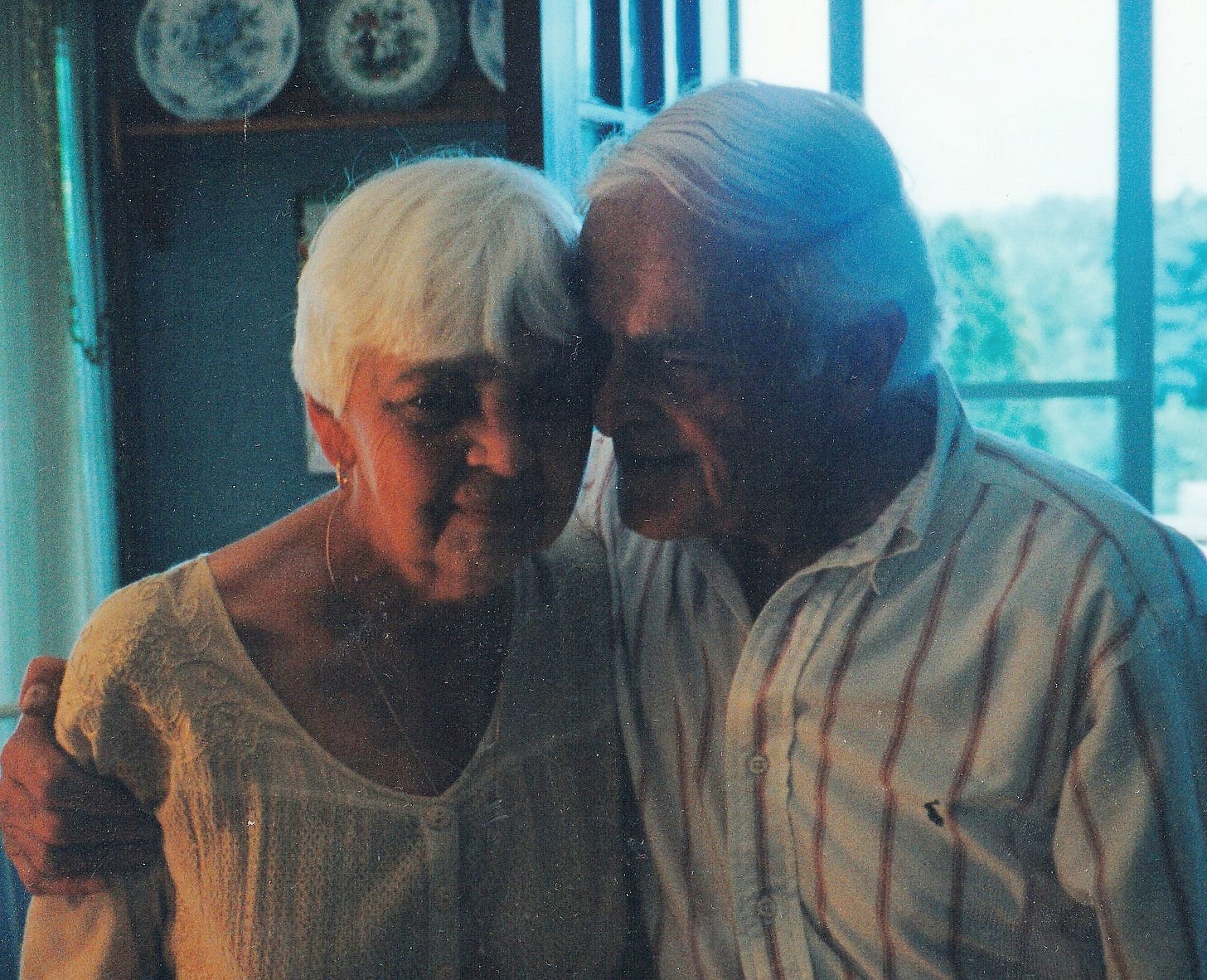Both are long dead, but today is my parent's 77th wedding anniversary. During their lives, my parents were able to celebrate together fifty-one wedding anniversaries before my mum died at the age of seventy-one from cancer in 1999. Mum stopped breathing in mid kiss with my father.
During the decades between those two kisses, my mother's love for my father waxed then waned as if it were sunlight- intense at midday and then sometimes it became a thin and brittle illumination like dusk just before nightfall.
It never burned out entirely but needed coaxing to keep the spark glowing. But her love for him was intense throughout their 5 decade relationship. The human heart- even with the most compatible mate sometimes fits with another as uncomfortably as a pair of shoes bought in haste. As marriages go; it was good, meaningful and had its rewards. Each was loyal to maintaining the dignity of the other. It was a relationship that was more than the sum of the children they made together. It was an emotional, spiritual and physical alliance between two people who were profoundly wounded by extreme poverty in my father’s case and in my mum’s -living under a brutal Nazi regime.
When my parents married in Hamburg on August 16th, 1947, Europe was in a heatwave. The greatest war fought by the greatest generation was only two years done, and the world was still licking its wounds from that brutal conflict between good and evil. My mum was an 18-year-old German woman, and my dad was a 23-year-old lad from Yorkshire stationed in the city as part of Britain’s occupation force following the war. They both suffered from traumas caused by the war but also what they had experienced growing up as children.
My parents, like most young people, stumbled into their love affair by chance. My dad noticed my mother bartering away prized family possessions at a black market. He thought she was the most beautiful woman he had ever seen, and he lusted after her. So, he pursued her and eventually, they became lovers. My mum did not have as strong a feeling for my dad as he had for her when they were first lovers. Life was short, and she was young and wanted to taste as many pleasures as possible because she had seen so much death and come close to it herself. Over time, because of his devotion to her, and his endless ability to help her, and her family, in an unforgiving post-war world, the love my mother had for my father became strong enough to agree to his marriage proposal. Below is my father in Love Among the Ruins recounting his marriage to his Friede, my mother. I have also included an excerpt from The Green and Pleasant Land from the year 1948 when their marriage began to fall apart.
Chapter 25
16 August 1947
Until the sun rose, I endured restless and disquieting dreams. I was relieved to be awake and away from my subconscious, which was like a cemetery where too many corpses were buried in shallow graves. In my dreams, I saw my Dad’s sad face. I wasn’t sure if the dream was wishing me well or warning me of rough times ahead.
Whether the dreams were omens or glad tidings, I realised I still had to prepare for my wedding and ensure that all the food and drink were available for the reception.
For a hefty bribe, I had made arrangements with the camp cook to provide all the food for the feast, from cakes to exquisite sandwiches. The three-tier wedding cake was baked by a pastry chef attached to the NAAFI in Hamburg. Everything for the wedding reception was transported on an RAF truck and delivered at 10.00am. I had press-ganged some other servicemen with promises of beer to help unload and set up the banquet tables, chairs, food and flowers for the reception. Everything was assembled in Maria Edelmann’s oversized bedroom as it was the only suitable space to fit 25 guests.
I returned to camp to get cleaned up for the ceremony. As I dressed, I started to shake and had to sit down and have a cigarette. I was overcome by my good fortune and the fear it would run out. How is it possible, I asked myself, that I fell into this joy, this great promise of better days? I didn’t know the reason except blind luck. There were so many others who missed out on life and were cut down before their time because of the Great Depression or the war.
Yet I had somehow survived. I was granted by fortune or endurance or whimsy the chance to love and be loved in return. I had arrived at the entrance to a life worth living. ‘Don’t bugger it up,’ I said while brushing my hair tightly back.
When Stan and I rode up to the church in a jeep where there was a growing crowd of onlookers loitering around the entrance. Stan and I quickly rushed through the church doors and passed the assembled guests as we moved towards the altar. While I waited for Friede, Stan cracked jokes with me and the vicar.
It was hot inside the church and the air was stagnant. The padre was sweating and the organist looked uncomfortable on his stool. I mopped my brow with a handkerchief; Stan said, ‘Hope none of the neighbours nick the beer while we’re at church.’
After several more perspiring moments, I heard the doors open at the back of St Luke’s. The guests shuffled in their seats and then made an appreciative collective sigh.
Friede had arrived with her foster father, Max. The music was struck and Friede slowly walked towards me. Every step Friede took, she believed was a final and absolute negation of her stigma of being the bastard child of Fritz Adelt. Walking up that aisle, she wasn’t just coming towards me; she was walking away from her childhood sorrows, pains and humiliations. I wanted to turn around but dared not. Stan glanced backwards and whispered to me, ‘Blimey, she’s beautiful.’
Finally, Friede and Max were beside us. The organ notes faded away like a feather caught in a breeze. Max ceremoniously relinquished Friede to my care. He whispered in my ear: ‘Remember to be tender to my Friedl.’
Friede and I sheepishly smiled at each other. She whispered the words, ‘Ich liebe dich.’
The silk bridal gown magnified her loveliness and made her beauty appear timeless, untouchable, and seductive. Her beauty, history, and fragility humbled me as I stood in my RAF blue dress uniform. Friede held a bouquet of wildflowers, whose scent perfumed the air around us. It was a wonderful fresh aroma that made me think of our time walking in the botanical gardens.
Our wedding service wasn’t long but charged with emotion, laughter and human kindness. The chaplain joined us as man and wife but said this was also a marriage unique for this town and our garrison. It was the first post-war marriage between a Brit and a German.
It was a harbinger of peaceful days soon to come because if love could germinate between two young people from different cultures, the world would heal its wounds from the war. Finally, the vicar pronounced us man and wife. He blessed the union and we were wed.
Friede and I walked slowly and steadily to the church’s exit and on our way out, we received the adulation from the pews. I whispered a ‘thank you’ to Friede. She smiled and had tears in her eyes. For a brief second, I felt afraid of my new responsibility and hoped I wouldn’t disappoint her. I didn’t want to muddle up destiny’s kindness towards me.
On the steps of the church, a wedding photographer took our picture. Once pictures were taken, the guests were ferried to the reception in a fleet of Volkswagen taxis I commandeered earlier in the day for a hefty black-market bribe.
The feast, the feelings of goodwill, and the emotional atmosphere were never better at Maria Edelmann’s apartment than on the day of our reception. Everyone was content; no one brought- any disgruntled and disjointed emotions to the party. There were toasts from Friede’s mother. There were speeches from Sid and Dave. Congratulatory telegrams arrived from my mother and sister. Friede translated them into German and read them to the guests, who applauded my English family for their warm-hearted support.
We drank wine and beer and ate cakes and delicate sandwiches. Cigarettes were shared and hands held. I felt proud that I had orchestrated this- feast of love for Friede, her family and her friends. Halfway through the reception, Friede slipped out of the room. She quickly returned and sat beside her mother. They talked in low voices and then hugged each other warmly. Friede walked over to a painting hanging on the wall and placed a small wallet-sized photo of her father Fritz along the edges of the frame. She raised her glass and announced:
‘To my mother who loved me in dangerous times; to my foster mother for caring for me; to my foster father who loved me as his own.’ The wedding table broke into applause at the dedications. When the clapping stopped, Friede continued: ‘I raise my glass to Harry, who will love me until the end of days, and I shall love him whether the sea is in a storm or the waters calm.’
******************************
18 months later the emotions and circumstances are different. My parents are now living in Halifax, Yorkshire and my father is a civilian.
During the dying days of 1948, my relationship with Friede started to unravel. Our love was forged in the cauldron of Germany’s terrible hunger winter. But Britain’s season of discontent tore apart the delicate bonds that held our marriage together. After living too long in the bleak and hopeless world of England’s working class, our affections began to cool. Our hearts had grown cold in an unattended hearth as if they were like orphaned embers of coal.
The passion that had stoked our love ran out of oxygen because we lived in society’s murky depths, where sunlight rarely shined. By Christmas day our marriage neared the beginning of its end.
There was a cold draft that wafted through our empty house when we returned home from Roy and Irma’s yuletide gathering. I noted the Christmas cards looked derelict, strung across the mantel in the cold and dark parlour. We lit some candles and started the fire. But Friede and I weren’t able to thaw the chilly emotions that we had developed for each other. Neither of us was sure when this animosity came upon us, but I was certain that it wasn't soon to pass. With Dorothy gone to her mother’s, we had free license to argue from sun up to sundown with only the hiss from the gas lights to distract our thoughts from our disintegrating union.
By Boxing Day, Friede and I were worn down from quarrelling. We argued over trifles, from whether the room was too cold or hot to why the tea always tasted like tepid water with a hint of rust. We no longer spoke to each other in civilized tones- but used surly and wounded inflexions to express our emotions, which were divided neatly into two camps: wounded pride and aching heart.
Irritable, irritated, or unfeeling was how we responded to the other’s rebukes. There appeared to be no solutions or map to save our relationship. It was more convenient and momentarily satisfying to slam a door in blinding exasperation or cut into the other with sarcasm and impatience rather than be honest with ourselves. Neither of us wanted to admit that we shared some blame for the mess we had made of our marriage, nor did we want to admit, that our marriage was failing from a thousand disappointments, a thousand dreams washed away because of a fractured economy, and a thousand promises broken because we never felt that we could get ahead of the past. Time was no balm because we knew it never wavered or stopped; it moved onwards and left our illusions of a prosperous and momentous life on the kerb side, waiting to be collected by the dustman.
Between the hours after rising from bed and going to sleep, we sought to escape each other’s company or touch. When by chance we brushed up against the other, it was as uncomfortable as when two boats slipped their moorings in a harbour and scraped sides. It was preferable to be apart from each other rather than endure moments of mutual reproach that seemed to burrow underneath our skin and fester in an ooze of raw emotion.
I found no consolation, nor did Friede, by the fact that our friends, acquaintances, and millions of other people on this mirthless island were as unhappy as us.
The Harry’s Last Stand project, which I worked on with my Dad, for the last 10 years of his life, was an attempt to use his life story as a template to effect change and remake a Welfare State fit for the 21st century. His unpublished history- The Green & Pleasant Land is a part of that project. I have been working on it, refining it, and editing it to meet my dad’s wishes. It should be ready for a publisher sometime this month or in August. This book of my dad’s ends with his eye witness account of the 1945 General Election. It makes for an interesting contrast to what was offered for Britain by today’s Labour Government during this summer’s General Election. Neoliberalism has definitely short changed the generations living in the 21st century.
Your support in keeping my dad’s legacy going, and me alive is greatly appreciated. I depend on your subscriptions to keep the lights on and me housed. So if you can, please subscribe, and if you can’t -it is all good because we are fellow travellers in penury. But always remember to share these posts far and wide. I have also added a tip jar if you are so inclined.
So if you can join with a paid subscription which is just 3.50 a month or a yearly subscription or a gift subscription. I promise the content is good, relevant and thoughtful. But if you can’t it all good too because I appreciate we are in the same boat. Take Care, John
Aug 16, 1997







